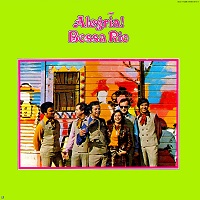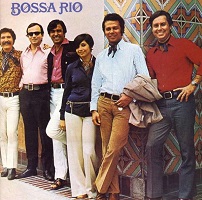In a discussion on the old blog about groups similar to Sergio Mendes & Brasil '66 , the first name that came up was of course the Sergio Mendes produced Bossa Rio. If you're a bit familiar with Brazilian music you will see that this is a kind of 'supergroup'. Members are from left to right (on the upper cover): Osmar Milito (keys), Manfredo Fest (keys), Ronald Mesquita (drums), Gracinha Leporace (vocals), Pery Ribeiro (vocals) and Octavio Bailly Jr. (bass). Milito was replaced by Dwight Dickerson (piano) for the second album.
Probably none of these names were familiar with North American audiences at the time and consequently the personnal is not credited on the album covers, but all of them played important roles in Brazilian music:
Octavio Bailly already was a member of the first Bossa Rio group (Sergio Mendes' Bossa Rio Sextet) and as such took part in the famous Carnegie Hall concert in 1962 as well as recording with Cannonball Adderley. He and Ronald Mesquita functioned as the second rhythm section for Luiz Carlos Vinhas' Bossa Tres. The Bossa Tres not only accompanied Pery Ribeiro on his album Reencontro, crooner and trio also stayed in Mexico between 1966 and 1968 performing and recording as Gemini 5 (with Leny Andrade). Shortly after his stay with Bossa Rio, Mesquita would do two great albums that perfectly transplanted the Brasil'66/Bossa Rio style into the 1970s (Bresil 72 and Ronie e Central do Brasil).
Pery Ribeiro could already look back on a ten year career as a crooner with several succesful albums for the Brazilian market, among them Pery é todo bossa, the album that featured the first recording of Garota de Ipanema.
Manfredo Fest was a great blind jazz pianist who's albums from the 1960s are worth checking out for fans of jazz samba, while records like Brazilian Dorian Dream from 1976 are cult items among admirers of jazz fusion.
Osmar Milito is best known for his work for the Telenovelas (soap operas) as well as a handful of pop records similar in style to Marcos Valle.
Gracinha Leporace would become the singer for Brasil '77 and Mrs Mendes. She and her brother Fernando had done two albums with the protest group Groupo Manifesto. We will meet Fernando here soon, too, since he recorded a wonderful pop/psych album with the group Vox Populi.
The music's a well-balanced mix of contemporary Brazilian and North American tunes, wisely avoiding songs which were already recorded by Brasil' 66. The one exception being Wave, the only Tom Jobim piece here, which is taken at a slower pace than the Brasil '66 version.
Jorge Ben provides three of the "hardest" and grooviest pieces, all of which get worthy treatments and are definitely highlights. Edu Lobo, Milton Nascimento, Caetano Veloso and Marcos Valle are all represented with one song, but while Milton's Cancao do Sal is a quite obvious choice (and another highlight), Lobo's Veleiro is a rarely covered song. Bossa Rio's take is remarkably different from it's original version, which can be heard on Edu e Bethania.
It's easy to guess that the lyrics of For Your Love Now, the English language take of Marcos Valle's Mustang cor de Sangue ("Blood-colored Mustang"), bear no resemblance at all to the original words. This set of English lyrics is another questionable effort from Mr Norman Gimble, who unfortunately "translated" many Brazilian classics. The music is excellent nonetheless.
Since i never cared for Caetano Veloso, i'm not familiar with the original version ofToday, Tomorrow (Boa Palavra), but Gracinha's singing is especially delicate here.
Lennon/McCartney were as inevitable as Bacharach/David. It's arguable that we need another version of Eleanor Rigby, while Blackbird, one of the few gentle moments on the White Album, get's a surprisingly dynamic treatment. Do you know the Way to San Jose is a personal favourite from the Bacharach book and doesn't dissapoint.
The weakest moments, at least for this listener, are those where older standards are treated, like Day by Day or The Night has a thousand Eyes. Somehow they just don't seem to click. I always felt similar about Brasil '66' takes of tunes from the great American songbook.

 Plattentipp
Plattentipp 



